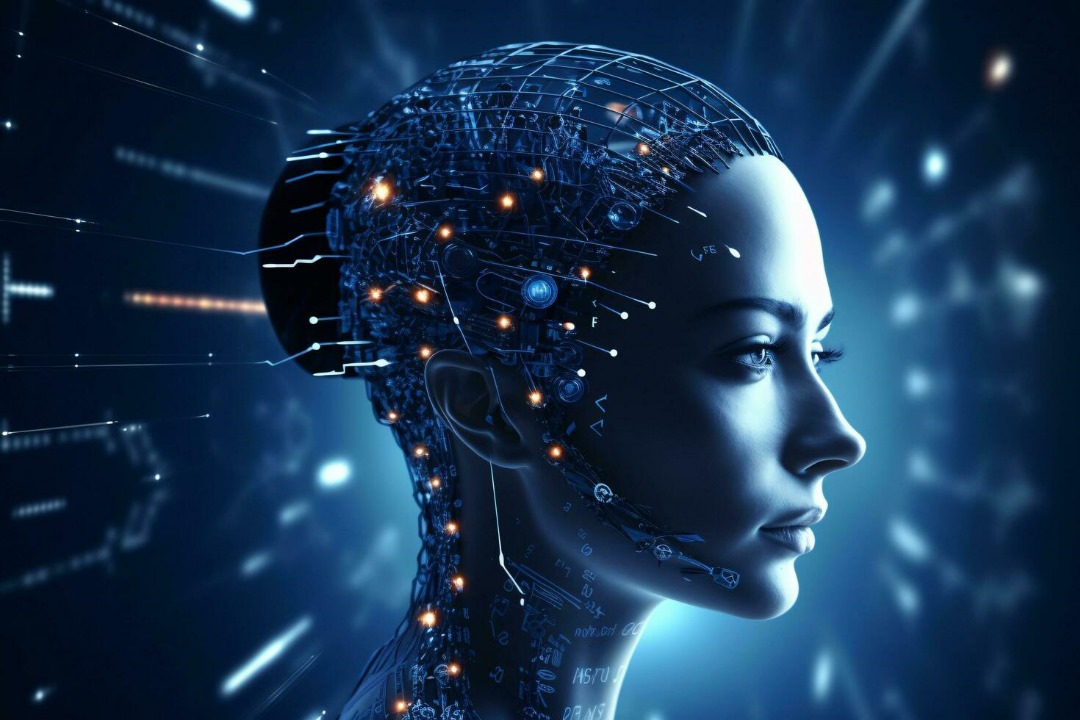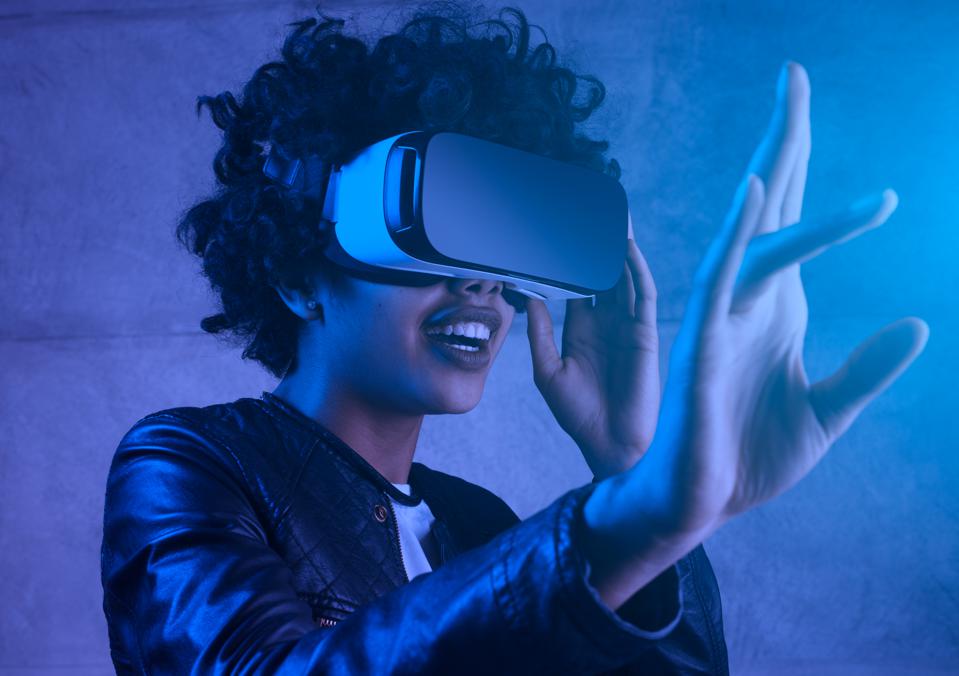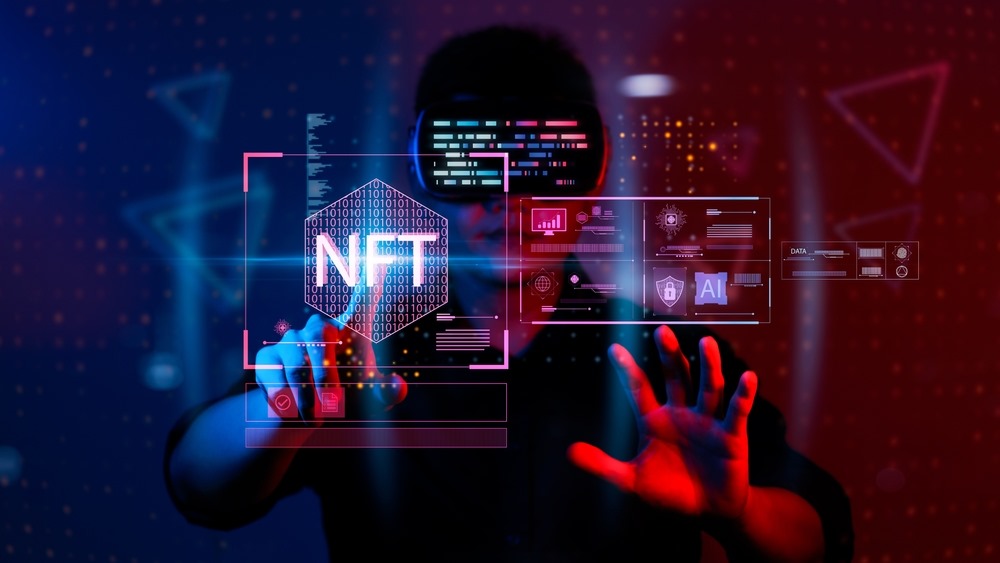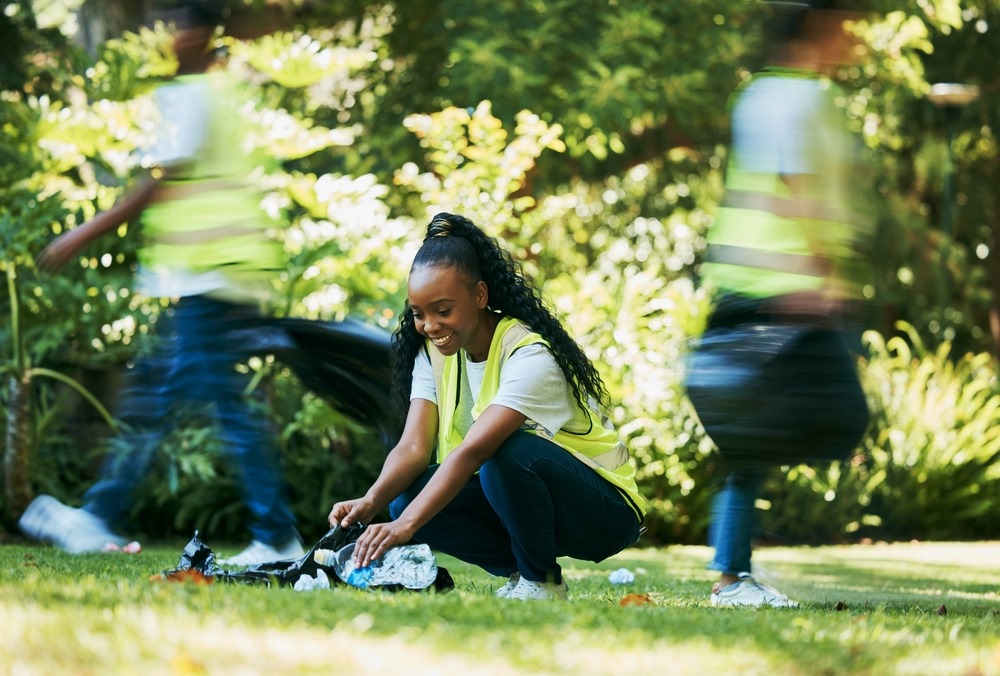The Use of Artificial Intelligence in Detecting Fake News - #BigIdeasPlatform2024isHere
The spread of fake news has become a serious issue in today's digital age and challenges the foundation of our information society. In the modern day of social media rapid communication, the spread of false or misleading information disguising it as trustworthy journalism has achieved unmatched popularity. Fake news is a powerful force that affects all facets of our lives because it is so simple to generate false narratives and spread them to a large audience. The effects of fake news are severe and widespread, whether they involve politically driven misinformation efforts, sensationalised health claims, or false financial news.
The adverse effects of fake news are many and serious. It undermines people's confidence in trustworthy information sources and makes them doubtful of mainstream media and reputable institutions. The foundation of an educated society is being undermined by this lack of trust, creating uncertainty and false information. Fake news has the ability to sway public opinion, stir up anxiety, and even have an impact on important decisions like political elections. The democratic process is seriously endangered by the use of disinformation to manipulate public opinion. Therefore, the capacity to recognize fake news is crucial. It not only helps people make informed decisions, but it also protects the integrity of our information environment.
Advancements in Artificial Intelligence (AI) have significantly simplified daily human activities. Developed by OpenAI, the Chat Generative Pretrained Transformer (ChatGPT) serves as an example of these AI technologies. ChatGPT operates as a text-based conversational agent, providing textual responses to user queries. AI algorithms have been shown to be useful in detecting fake news or misinformation that may be interfering with efficiency and optimization. Proponents of using AI in the detection of fake news suggest that certain principles need to be followed, including the development of strategies by software designers to combat fake news, enabling software users to report fake news when detected, and keeping users informed of the dissemination of fake news. For example, deep learning, machine learning, and natural language processing can extract text- or image-based cues to train models to aid in the prediction of the authenticity of news. Alternatively, AI can be used to examine the social context of the news article, including features of the poster, such as the number of shares or retweets of the post. However, Generative AI tools like ChatGPT can also facilitate the spread of misinformation or fake news to the detriment of those seeking information on virtually any topic, particularly health, finances, and politics. In extreme cases, the spread of misinformation through the use of AI-generated videos or written content can set factions against one another, with violence.
The prevalence of large language models like ChatGPT in various domains, from healthcare to information dissemination, is undeniable. While they show promise in democratizing access to information and aiding in research, ethical and accuracy-related challenges loom large. Notably, the models’ capacity for generating misleading or false information raises ethical concerns, such as in the realm of fake news generation. The consequence extends from eroding trust in AI systems to affecting user perceptions, as corroborated by empirical studies. Additionally, personal harm can befall users as misinformation about health and finances, among other things, is generated and disseminated. Data ownership, user consent, and representational bias are additional layers of complexity in this discourse. Therefore, it is crucial to address these issues comprehensively for the responsible and equitable application of these potent tools in diverse sectors.
In our battle against the trend of fake news on social media, Artificial Intelligence offers powerful tools for mitigating the spread of misinformation, but its deployment must be accompanied by careful consideration of ethical, societal, and technical implications. Understanding fake news is as convoluted as understanding human behaviour. Consequently, fighting it requires multifaceted strategies. Considering that the technology that counters fake news is the same technology that created it, neutralizing it may take more than just the expertise of top tech companies. The potential methods of detection and neutralization through AI form the basis of the discussions that we will be having at the Big Idea Platform 2024.
In 2023, The School of Politics, Policy & Governance (SPPG) partnered with the Shehu Musa Yar’Adua Foundation to launch the inaugural Big Ideas Platform, centered around "Reawakening the African Renaissance: Pathways to Inclusive Growth and Development." Five innovative African leaders shared groundbreaking ideas aimed at improving African communities' quality of life. This year, The School of Politics, Policy & Governance (SPPG) is excited to announce Big Ideas Platform 2024, in collaboration with the Shehu Musa Yar’Adua Foundation, on May 25th, 2024. This year's theme, "Information Technology and Behaviour Change," will convene intellectuals, policymakers, technocrats, and changemakers to discuss transformative ideas and solutions for Africa's inclusive prosperity and sustainable development.
The event is open to the public, and registration is free. It will be a great opportunity to learn from thought leaders and professionals about how Artificial Intelligence can be harnessed not only to combat fake news but also to improve Africa's economy and enhance its development.
Date: May 25, 2024 (Africa Day)
Time: 9:00 AM – 12 PM WAT (GMT+1)
Venue: Shehu Musa Yar'Adua Center, Abuja/ Zoom
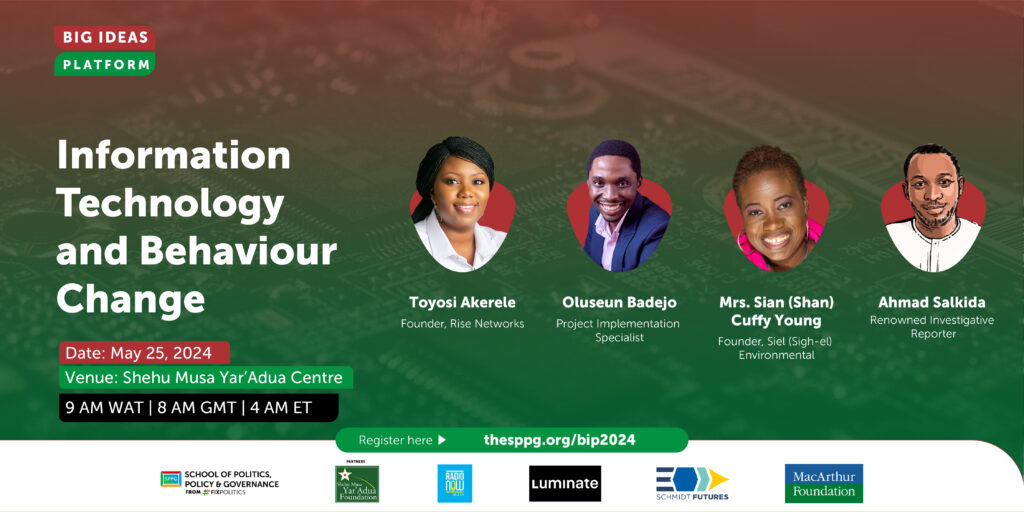
Click Here to register for #BIP2024 and stay up to date with event updates.
The Use of Virtual Reality In Addressing Challenges - #BigIdeasPlatform2024isHere
With the rapid technological advancements in recent decades, Virtual Reality (VR) has been increasingly adopted as a transformative technology with the potential to address various challenges across diverse fields. Virtual reality (VR) can be defined as an environment-building technology that enables participants to immerse themselves in their surroundings and interact with the elements. However, a broader definition of VR also includes non-immersive and semi-immersive virtual environments, such as desktop VR. This technology has gained popularity, with the market size projected to reach $62.1 billion by 2027. Previously, its use was mainly associated with entertainment and gaming, but the technology has also seen immense success in health care for training in complex procedures such as surgery, in the mining industry to simulate emergency situations, and in the automotive industry to improve driving and reduce accidents. The use of VR for training has seen immense growth because it provides an interactive learning environment that is both engaging and fun. For most people, it is something they do not use at home, so the experience is a major boon for the engagement of a workforce that would have previously experienced many different, conventional training programs.
One significant application of VR is in the fields of healthcare and education where the technology has transformed learning methods by providing immersive and interactive experiences. In the healthcare field, surgical simulators are used to enable trainee surgeons to practice procedures in a realistic virtual environment, reducing the learning curve and enhancing patient safety. VR experiences have been utilized to alleviate pain and discomfort during medical procedures, enhancing patient comfort and reducing reliance on traditional analgesics. In the field of education, VR simulators have been used to explore pivotal moments in history which enhances student engagement and retention. VR-based language learning applications also facilitate language acquisition through immersive cultural experiences and interactive exercises.
These diverse virtual training offer many advantages over traditional learning, which, even with engaging presenters, tends to rely on PowerPoint presentations that can be unappealing and reduce engagement. With a training program enhanced by VR, there is less training material required and the trainer’s time is reduced, making VR training convenient and easy to provide multiple times. Simulations in VR allow for mistakes to be made without experiencing the consequences, providing opportunities to try different ways of working and explore improvements, especially in activities that relate to emergency situations. For sequential activities, the repetition of the tasks in VR provides a safe environment to practice, increasing information retention and instilling confidence in the trainee to carry out the task in the real world. VR training is proving to be very cost-effective, as it brings the site to the trainee, eliminating the cost challenges that come with travel.
While the benefits and advantages of deploying this technology in enhancing training programs within different fields, there are certain ethical concerns that need to be addressed to fully maximise its effectiveness. The ethical concerns associated with VR technology are multi-faceted. One concern is addiction, where users may become excessively absorbed in virtual environments, which is detrimental to mental health. There is also a fear that virtual crime could escalate and become more prevalent in society, leading to confusion about what constitutes a real-world crime versus a virtual one. Another concern is the use of VR technology in various industries, such as military and defence, healthcare, and entertainment. The ethical implications of using VR in these industries are varied, ranging from the potential for creating more realistic and practical training scenarios to the possibility of exploiting vulnerable populations or exposing sensitive information. Additionally, there are privacy concerns surrounding VR technology. As users enter virtual environments, data is collected and stored on their actions, preferences, and behaviours. This personal data may be used to manipulate users and influence their actions, as seen in targeted advertising.
Despite these concerns, the future of VR appears promising, with ongoing advancements in hardware, software, and content development. These opportunities form the basis of the discussions that we will be having at the Big Idea Platform 2024.
In 2023, The School of Politics, Policy & Governance (SPPG) partnered with the Shehu Musa Yar’Adua Foundation to launch the inaugural Big Ideas Platform, centered around "Reawakening the African Renaissance: Pathways to Inclusive Growth and Development." Five innovative African leaders shared groundbreaking ideas aimed at improving African communities' quality of life. This year , The School of Politics, Policy & Governance (SPPG) is excited to announce Big Ideas Platform 2024, in collaboration with the Shehu Musa Yar’Adua Foundation, on May 25th, 2024. This year's theme, "Information Technology and Behaviour Change," will convene intellectuals, policymakers, technocrats, and changemakers to discuss transformative ideas and solutions for Africa's inclusive prosperity and sustainable development.
The event is open to the public, and registration is free. It will be a great opportunity to learn from thought leaders and professionals about how Virtual Reality can be harnessed not only to across diverse industries but also to improve Africa's economy and enhance its development.
Date: May 25, 2024 (Africa Day)
Time: 9:00 AM – 12 PM WAT (GMT+1)
Venue: Shehu Musa Yar'Adua Center, Abuja/ Zoom
Click Here to register for #BIP2024 and stay up to date with event updates.
Join us, let's co-create the Africa we need.
Unveiling the Impact of Blockchain Technology on the Educational System: #BigIdeasPlatform2024IsHere
Blockchain is a revolutionary technology that has the potential to revolutionise various industries, including finance, supply chain management, healthcare, and education. Its decentralised, secure, and transparent nature makes it ideal for use in industries where trust, security, and efficiency are of paramount importance. The integration of blockchain technology into the education system has the potential to greatly improve the efficiency, security, and credibility of the educational process. By creating secure and transparent platforms for tracking and verifying students’ academic achievements, blockchain technology can help to create a more accessible and trustworthy education system, making it easier for students to showcase their skills and knowledge to potential employers.
One of the primary benefits of blockchain in education is the creation of a tamper-proof and secure digital transcript. This transcript can store a student’s academic history, including grades, certifications, and other achievements, in a decentralised and secure manner. This can eliminate the need for traditional paper-based transcripts, which can be easily lost, damaged, or tampered with. Another potential benefit of blockchain in education is the creation of a centralised platform for the issuance and verification of digital credentials. This can greatly simplify the process of obtaining and verifying academic credentials, as it eliminates the need for intermediaries to validate them. Additionally, the secure and transparent nature of blockchain can help to prevent fraud, as it provides a reliable and tamper-proof record of a student’s achievements.
Another area where blockchain can have a significant impact is in the area of online education. By incorporating blockchain technology into online learning platforms, educators can create secure and trustworthy systems for delivering and tracking online courses and certifications. This can help to improve the credibility and recognition of online education, making it a more attractive option for students and employers alike. Starting with the general idea, blockchain is a revolutionary technology with the potential to revolutionise various industries, including education. By creating secure and transparent platforms for tracking and verifying students’ academic achievements, blockchain technology can help to create a more accessible and trustworthy education system, making it easier for students to showcase their skills and knowledge to potential employers.
One of the primary challenges hindering the widespread adoption of blockchain in education is the perceived technological complexity. Implementing blockchain-based solutions requires expertise in distributed systems, cryptography, and smart contract development, which may be beyond the capabilities of many educational institutions. Additionally, the regulatory and legal landscape surrounding blockchain technology is still evolving, posing uncertainties and compliance challenges for educational stakeholders. Concerns related to data privacy, intellectual property rights, and jurisdictional issues need to be addressed to ensure the lawful and ethical use of blockchain in education.
Despite these challenges, the integration of blockchain technology holds immense promise for transforming the educational system into a more transparent, secure, and efficient ecosystem. The potential of incorporating this technology into the educational sector in Africa forms the basis of the discussions that we will be having at the Big Idea Platform 2024.
In 2023, The School of Politics, Policy & Governance (SPPG) partnered with the Shehu Musa Yar’Adua Foundation to launch the inaugural Big Ideas Platform, centred around "Reawakening the African Renaissance: Pathways to Inclusive Growth and Development." Five innovative African leaders shared groundbreaking ideas aimed at improving African communities' quality of life. This year , The School of Politics, Policy & Governance (SPPG) is excited to announce Big Ideas Platform 2024, in collaboration with the Shehu Musa Yar’Adua Foundation, on May 25th, 2024. This year's theme, "Information Technology and Behaviour Change," will convene intellectuals, policymakers, technocrats, and changemakers to discuss transformative ideas and solutions for Africa's inclusive prosperity and sustainable development.
The event is open to the public, and registration is free. It will be a great opportunity to learn from thought leaders and professionals about the Use of Blockchain Technology In The Educational System.
Date: May 25, 2024 (Africa Day)
Time: 9:00 AM – 12 PM WAT (GMT+1)
Venue: Shehu Musa Yar'Adua Center, Abuja/ Zoom
Click Here to register for #BIP2024 and stay up to date with event updates.
The Use of Learning tools to Build awareness of Waste Management: #BigIdeasPlatform2024isHere
Solid Waste Management is a multifaceted problem comprising political, socioeconomic, institutional, and environmental aspects. Due to exponential urban growth, it has become one of the most significant issues faced by urban spaces in developing countries. The gap in environmental knowledge among the youth and the old within developing countries contributes to ecological issues or waste management problems, resulting in unsustainable development, with important consequences in low-income countries. Most of the low/middle-income countries are unable to provide effective waste management collection services because of resource constraints, lack of facilities including vehicles, and infrastructure, improper route planning, lack of technical know-how, and inadequate environmental education and awareness. To sustain SW or environmental issues in developing countries, formal education for sustainable development is essential at all levels of education, able to trigger a whole societal transformation. For better environmental sustainability or waste management sustainability education, teachers with the right knowledge, attitude, skills, and innovation, are required.
Awareness plays a pivotal role in shaping individual behaviours and attitudes towards waste management. Lack of awareness often leads to improper disposal practices such as littering, illegal dumping, and indiscriminate waste disposal, exacerbating environmental degradation and pollution. Educating the public about the environmental consequences of improper waste disposal and the benefits of adopting sustainable practices is crucial for fostering responsible behaviour and promoting a culture of waste reduction and recycling. Learning tools, including educational programs, digital applications, and interactive platforms, offer effective means of disseminating information and engaging individuals in waste management initiatives. Educational programs conducted in schools, communities, and workplaces provide structured learning experiences that raise awareness and promote sustainable waste practices among participants. Digital applications and online platforms offer interactive tools and resources, allowing users to access information, track their waste footprint, and participate in recycling programs conveniently.
The search for improved environmental quality has driven several governments in developing nations to adopt the use of Environmental Education in improving the attitude and behaviour of its citizenry towards waste management. One could ask what is the behaviour of undergraduate students towards waste management in Nigeria. Waste management behaviours are all attitude, disposition and perception towards properly disposing of waste in any environment one finds himself. Waste management behaviour includes open dumping, careless attitude towards properly disposing of institutional waste like food wrappers, torn books or papers, hotel food remains, vegetable remains etc. A degraded environment can only offer a degraded quality of life. If we really desire to sustain and improve upon the present quality of life, then it is the collective responsibility of every living human being to secure the quality of the environment.
It has been repeatedly emphasized that there is an irrepressible need for entrenching Environmental Education as a leading approach to solving environmental problems and creating a sustainable society. The poor as well as the affluent are equally vulnerable to environmental damage. The poor and poverty-stricken people, wherever they may live, are generally preoccupied with the issue of physical survival. They lack money, skills and knowledge and therefore oftentimes, tend to over-utilise local resources beyond sustainable levels. They, therefore, need to be empowered to be able to control their resources and therefore their lives according to the tenets of a sustainable, safe and clean environment for healthy living in society.
The implementation of these learning tools to facilitate Environmental Education faces several challenges, including limited access to technology and cultural differences. Additionally, sustaining public interest and engagement in long-term waste management initiatives requires continuous efforts and resources. These implementation methods and challenges form the basis of the discussions that we will be having at the Big Idea Platform 2024.
In 2023, The School of Politics, Policy & Governance (SPPG) partnered with the Shehu Musa Yar’Adua Foundation to launch the inaugural Big Ideas Platform, centered around "Reawakening the African Renaissance: Pathways to Inclusive Growth and Development." Five innovative African leaders shared groundbreaking ideas aimed at improving African communities' quality of life. This year , The School of Politics, Policy & Governance (SPPG) is pleased to announce Big Ideas Platform 2024, in collaboration with the Shehu Musa Yar’Adua Foundation, on May 25th, 2024. This year's theme, "Information Technology and Behaviour Change," will convene intellectuals, policymakers, technocrats, and changemakers to discuss transformative ideas and solutions for Africa's inclusive prosperity and sustainable development.
The event is open to the public, and registration is free. It will be a great opportunity to learn from thought leaders and professionals about how we can Use of Learning tools to Build awareness of Waste Management.
Date: May 25, 2024 (Africa Day)
Time: 9:00 AM – 12 PM WAT (GMT+1)
Venue: Shehu Musa Yar'Adua Center, Abuja/ Zoom

Click Here to register for #BIP2024 and stay up to date with event updates.
About the Big Ideas Platform: The Big Ideas Platform is a thought leadership initiative developed by the School of Politics, Policy, and Governance. With a focus on empowering African innovators and amplifying their voices, this platform aims to promote dialogue, collaboration, and action to address the pressing challenges faced by African communities. By highlighting transformative ideas, the Big Ideas Platform strives to facilitate inclusive growth, development, and the realization of the African Renaissance.

